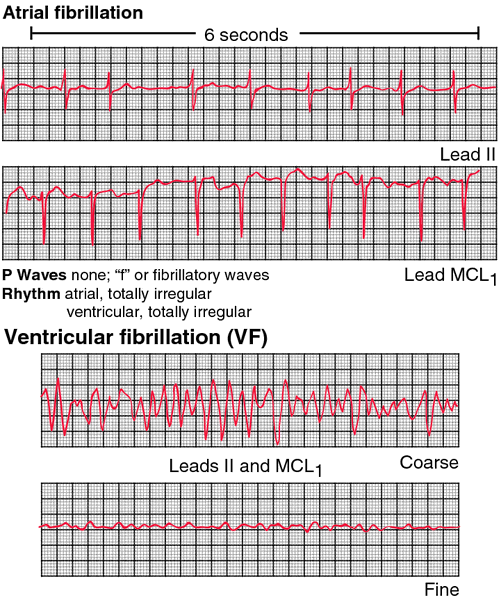Medical term:
fibrillation
fibrillation
[fi″brĭ-la´shun]1. a small, local, involuntary, muscular contraction, due to spontaneous activation of single muscle cells or muscle fibers.
2. the quality of being made up of fibrils.
3. the initial degenerative changes in osteoarthritis, marked by softening of the articular cartilage and development of vertical clefts between groups of cartilage cells.

Fibrillation on an electrocardiographic tracing. From Fenstermacher and Hudson, 1995.
atrial fibrillation a reentrant cardiac arrhythmia marked by rapid randomized contractions of the atrial myocardium, causing a totally irregular rapid atrial rate. It is recognizable on an electrocardiogram by the absence of P waves and an irregular ventricular response. It may be controlled by drug therapy or cardioversion.
ventricular fibrillation a cardiac arrhythmia marked by fibrillary contractions of the ventricular muscle due to rapid repetitive excitation of myocardial fibers with ineffectual ventricular contraction; on the surface electrocardiogram it is characterized by lack of identifiable QRS complexes. This is a frequent cause of cardiac arrest. An apparatus called a defibrillator is used to alleviate it by delivering an electric shock to the heart muscle; this depolarizes the myocardium and ends the irregular contractions so that the heart can resume normal, regular contractions.
Miller-Keane Encyclopedia and Dictionary of Medicine, Nursing, and Allied Health, Seventh Edition. © 2003 by Saunders, an imprint of Elsevier, Inc. All rights reserved.
fi·bril·la·tion
(fī-bri-lā'shŭn, fib-rĭ-),1. The condition of being fibrillated.
2. The formation of fibrils.
3. Exceedingly rapid contractions or twitching of muscular fibrils, but not of the muscle as a whole.
4. Vermicular twitching, usually slow, of individual muscular fibers; commonly occurs in atria or ventricles of the heart as well as in recently denervated skeletal muscle fibers.
Farlex Partner Medical Dictionary © Farlex 2012
fibrillation
(fĭb′rə-lā′shən, fī′brə-)n.
1. The forming of fibers.
2.
a. Fine, rapid twitching of individual muscle fibers with little or no movement of the muscle as a whole.
b. Rapid uncoordinated twitching movements that replace the normal rhythmic contraction of the heart and may cause a lack of circulation and pulse.
The American Heritage® Medical Dictionary Copyright © 2007, 2004 by Houghton Mifflin Company. Published by Houghton Mifflin Company. All rights reserved.
fibrillation
Cardiology Unsynchronized random and continuously changing electrical activity in the myocardium, causing inefficient pumping of blood. See Atrial fibrillation, Ventricular fibrillation.McGraw-Hill Concise Dictionary of Modern Medicine. © 2002 by The McGraw-Hill Companies, Inc.
fi·bril·la·tion
(fib'ri-lā'shŭn, fī'bri-)1. The condition of being fibrillated.
2. The formation of fibrils.
3. Exceedingly rapid contractions or twitching of muscular fibrils, but not of the muscle as a whole.
4. Vermicular twitching, usually slow, of individual muscular fibers; commonly occurs in atria or ventricles of the heart as well as in recently denervated skeletal muscle fibers.
Medical Dictionary for the Health Professions and Nursing © Farlex 2012
fibrillation
Uncontrolled, rapid and irregular contraction of muscle, especially heart muscle. Fibrillation most commonly affects the upper chambers of the heart (atrial fibrillation) causing an irregular pulse. Fibrillation of the main pumping chambers (ventricular fibrillation) prevents pumping and is rapidly fatal unless normal beating can be restored by electrical defibrillation.Collins Dictionary of Medicine © Robert M. Youngson 2004, 2005
fibrillation
orventricular fibrillation
very rapid, irregular contractions of the ventricular muscle of the HEART that cause blood circulation to stop immediately. Under suitable circumstances, ventricular fibrillation can be stopped by passing an electric current through the heart, using a cardiac defibrillator.Collins Dictionary of Biology, 3rd ed. © W. G. Hale, V. A. Saunders, J. P. Margham 2005
Fibrillation
Rapid, uncoordinated contractions of the upper or the lower chambers of the heart.
Mentioned in: Defibrillation, Electrocardiography, Electrophysiology Study of the Heart, Ventricular Ectopic Beats, Ventricular Tachycardia
Gale Encyclopedia of Medicine. Copyright 2008 The Gale Group, Inc. All rights reserved.
fi·bril·la·tion
(fib'ri-lā'shŭn)1. The condition of being fibrillated.
2. The formation of fibrils.
3. Exceedingly rapid contractions or twitching of muscular fibrils.
Medical Dictionary for the Dental Professions © Farlex 2012
Latest Searches:
Voraxaze - Voranil - Voorhoeve - voodoo - VOO - Vontrol - von - vomitus - vomiturition - vomitory - vomitoria - vomito - vomitive - vomiting - vomit - vomica - vomerovaginalis - vomerovaginal - vomerorostralis - vomerorostral -
- Service manuals - MBI Corp